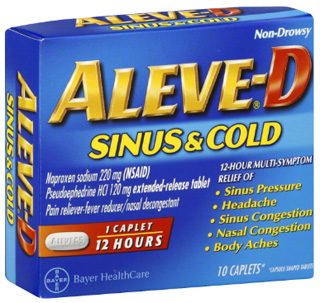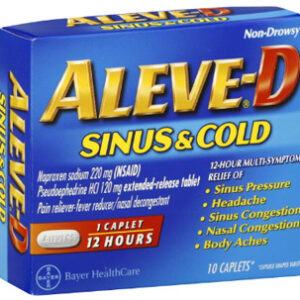Dosage Guidelines
The recommended dosage of Aleve, which contains the active ingredient Naproxen sodium, usually starts at one tablet taken with a full glass of water. For adults and children aged 12 and over, one tablet every 8 to 12 hours is customary while symptoms last. For the first dose, individuals may take two tablets within the first hour. Do not exceed 3 tablets in a 24-hour period unless directed by a healthcare provider. Always follow the dosing instructions specific to the Aleve product you’re using.
Purpose and Benefits
Aleve is an over-the-counter nonsteroidal anti-inflammatory drug (NSAID). It’s often employed to alleviate pain from various conditions such as headaches, muscle aches, tendonitis, dental pain, and menstrual cramps. Additionally, it can reduce pain and joint stiffness resulting from arthritis. It’s also effective as an antipyretic, meaning it can help bring down fever.
How It Works
Aleve operates by blocking the production of certain natural substances in your body that are associated with inflammation and pain. Naproxen sodium, its active ingredient, inhibits enzymes known as COX-1 and COX-2, leading to a decrease in the production of prostaglandins. This reduction in prostaglandins results in diminished inflammation and pain.
Potential Side Effects
While Aleve is effective in managing pain and inflammation, it may come with some unwanted side effects. Common adverse effects include stomach upset, heartburn, drowsiness, and headache. Serious side effects could involve high blood pressure, kidney problems, heart attack, or stroke. Gastrointestinal bleeding is also a concern, mainly if used long-term or in higher doses. It’s important to seek medical attention if any severe or persistent side effects occur.
Cautions and Alerts
Before taking Aleve, individuals should be aware of possible precautions and warnings. It can increase the risk of serious cardiovascular events such as heart attack and stroke, especially if used in higher doses or for long-term treatment. Additionally, it may cause stomach or intestinal bleeding, which can be fatal. Those with existing heart, kidney, or liver problems, high blood pressure, or a history of stomach ulcers should consult a healthcare provider before using Aleve.
Usage Restrictions
Aleve should not be taken if there is a known allergy to Naproxen sodium or any other part of the drug. It’s also contraindicated for individuals recovering from coronary artery bypass graft surgery. Patients with certain medical conditions like severe heart failure, active gastrointestinal bleeding, or a history of allergic reactions to other NSAIDs or aspirin should avoid taking Aleve.
Drug Combinations
When combining Aleve with other medications, it’s essential to be cautious. Drugs that may interact with Aleve include anticoagulants, other NSAIDs, aspirin, corticosteroids, antihypertensives, and certain antidepressants among others. Combining Aleve with alcohol can increase the risk of stomach bleeding. Always check with a healthcare provider before starting any new medications or supplements.
Excess Use Response
In case of overdose, urgent medical attention is required. Symptoms may include nausea, vomiting, stomach pain, dizziness, or drowsiness. Severe symptoms might be slow or shallow breathing, convulsions, or the absence of consciousness. If someone has overdosed and has serious symptoms such as passing out or trouble breathing, call 911. Otherwise, call a poison control center right away.
Handling and Storage
Aleve should be stored at room temperature, away from light and moisture. Do not store in the bathroom and keep all medications away from children and pets. Do not flush medications down the toilet or pour them into a drain unless instructed to do so. Properly discard this product when it is expired or no longer needed.
Essential Safety Details
While taking Aleve, drink plenty of fluids to prevent dehydration unless your doctor directs you otherwise. Avoid prolonged sun exposure, tanning booths, and sunlamps, as this medication might make you more sensitive to the sun. Use sunscreen and wear protective clothing when outdoors.
Common Queries
Can I take Aleve on an empty stomach?
It’s advisable to take Aleve with food, milk, or an antacid to prevent stomach upset.
How quickly does Aleve take effect?
It typically starts working within 30 minutes to an hour.
Can I consume alcohol with Aleve?
Alcohol can increase the risk of stomach bleeding caused by Naproxen sodium. It’s best to avoid alcohol while taking this medication.
Is Aleve suitable for children?
Aleve is generally not recommended for children under the age of 12 unless prescribed by a healthcare provider.
What should I do if I miss a dose?
If you miss a dose, take it as soon as you remember. If it’s near the time of the next dose, skip the missed dose. Do not double the dose to catch up.
Can I use Aleve for a cold or flu?
Yes, Aleve can help reduce fever and relieve pain associated with cold or flu symptoms. However, ensure it’s appropriate for your specific symptoms and medical condition.
Can I take Aleve with other pain relievers?
Taking Aleve with other NSAIDs or pain medications may increase the risk of side effects. Consult with a healthcare provider before combining pain relievers.






Reviews
There are no reviews yet.